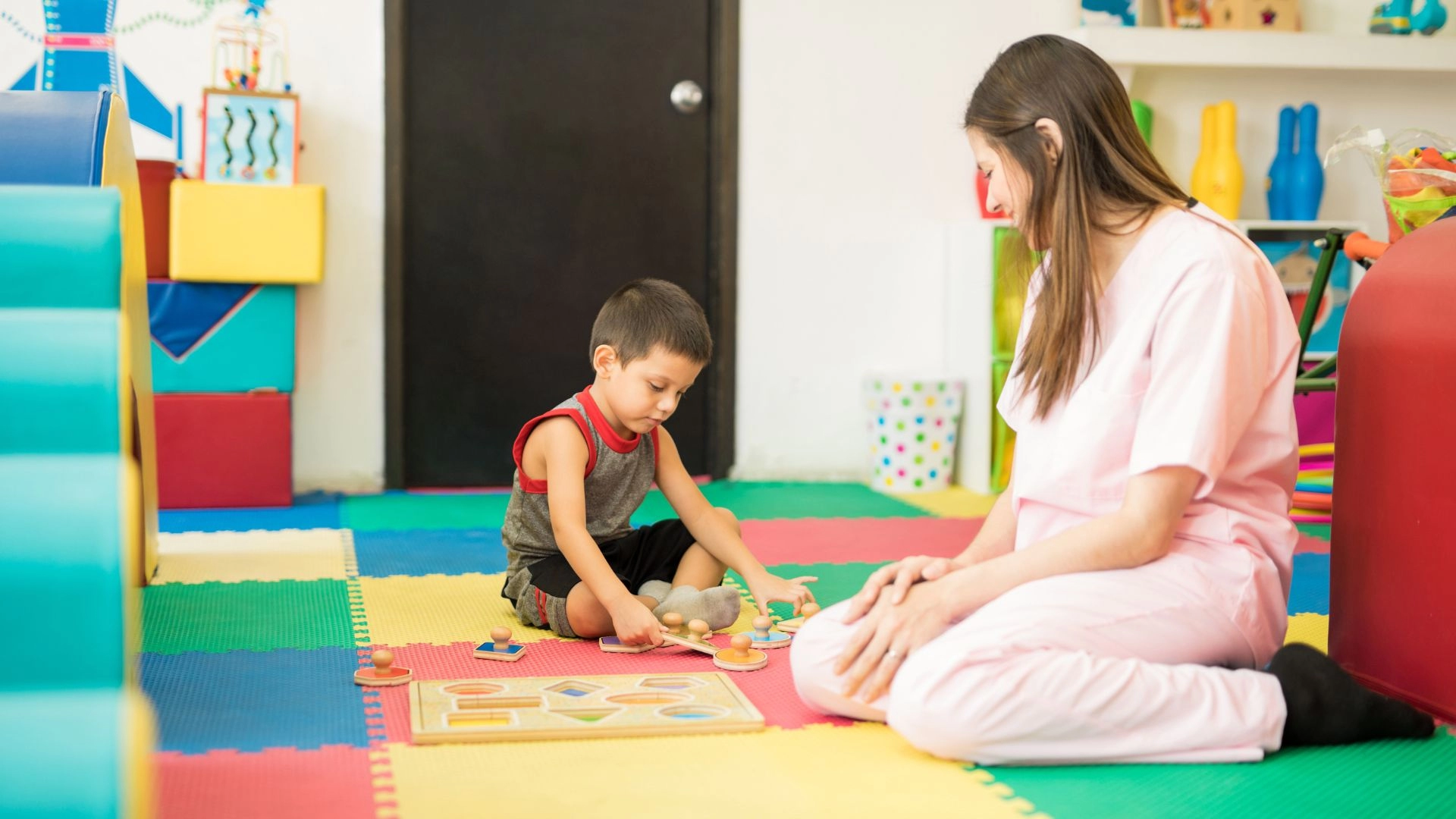Child Counseling Therapy for ASD in Mississauga
In Mississauga, we provide specialized Child Counseling Therapy for Autism Spectrum Disorder (ASD), focusing on nurturing emotional and social growth. Our experienced therapists tailor support to each child’s unique needs, incorporating proven methods like play and art therapy to foster self-expression and emotional awareness. We recognize the importance of early intervention, which can greatly enhance outcomes for children with ASD. Together, we can celebrate strengths and build essential skills for addressing challenges. If you’re interested in exploring how we can support your child, there are many valuable resources and insights waiting for you to discover.

About Child Counselling Therapy
Child counseling therapy is an essential resource that can greatly enhance the emotional and social well-being of children, particularly those managing the unique challenges associated with Autism Spectrum Disorder (ASD). In our experience, working with a child therapist who specializes in autism interventions provides tailored emotional support for children, helping them navigate their feelings and behaviors effectively.
Through behavioral therapy for kids, we can address specific challenges while promoting positive behaviors. This approach not only boosts child mental health services but also equips children with important social skills. Social skills therapy is particularly effective, as it fosters peer interactions and builds confidence in social situations.
Early intervention therapy is critical for children with ASD, as it can greatly improve outcomes. By identifying needs and implementing appropriate strategies early on, we can set the foundation for a brighter future. Additionally, therapy for special needs children is not just about addressing deficits; it’s about celebrating strengths and empowering our kids to reach their full potential.
Ultimately, child counseling therapy offers a supportive environment for both children and families, promoting resilience and understanding as we navigate the complexities of autism together.
Understanding Autism Spectrum Disorder (ASD) in Children
Understanding Autism Spectrum Disorder (ASD) in children requires us to recognize the diverse range of behaviors and challenges they may experience, fostering a compassionate perspective on their unique needs. ASD is a neurodevelopmental disorder that manifests differently in each child. Some may face communication challenges, making social communication difficult, while others may exhibit developmental delays or specific autistic traits.
An autism diagnosis often involves observing these characteristics and understanding the child’s individual profile. Early intervention is vital, as it can greatly improve outcomes for children with ASD. By addressing emotional regulation and developing strategies tailored to their needs, we can help them navigate their world more effectively.
It’s important to remember that each child on the autism spectrum has their own strengths and challenges. Autism treatment can include various therapies designed to support social skills, communication, and emotional growth. By embracing a holistic approach to understanding and addressing these needs, we can create a supportive environment that nurtures their development and fosters resilience. Together, we can advocate for the resources and support essential for these children to thrive.

How Child Counseling Helps Kids with Autism Thrive
How can counseling empower children with autism to navigate their unique challenges and enhance their social and emotional skills? Child counseling plays a significant role in supporting kids with ASD by providing tailored therapeutic interventions that foster emotional development and improve their overall quality of life. Through child therapy, we can help children learn effective communication skills, manage anxiety, and build self-esteem.
Behavioral therapy, a key component of many autism programs, equips children with practical tools to handle everyday situations. By engaging in therapy for kids, children gain insights into their emotions, which is essential for their social interactions. This process not only addresses immediate challenges but also lays the groundwork for long-term success.
Moreover, child counseling offers a safe space for children to express themselves, promoting resilience and a sense of belonging. With the right autism support, we can nurture their strengths, helping them thrive in various environments. Ultimately, by integrating these approaches, we empower children with autism to embrace their uniqueness and develop essential life skills, paving the way for a brighter future.
The Value of Early Intervention in Treating Autism Spectrum Disorder
When is the right time to initiate early intervention for children with autism spectrum disorder, and why is it so essential for their development? We believe that starting early childhood therapy as soon as a diagnosis is made can greatly impact a child’s growth. Research shows that early intervention can enhance communication skills, social interactions, and overall adaptability.
Utilizing autism services, such as applied behavior analysis (ABA), allows us to develop individualized education plans tailored to each child’s unique needs. Early autism therapy not only helps in managing the symptoms of this developmental disorder but also promotes better long-term outcomes.
By engaging in child counseling therapy, caregivers and children can foster autism awareness, understanding the challenges and strengths associated with autism. This proactive approach can effectively address any potential childhood trauma, ensuring that emotional and psychological needs are met.
Ultimately, our commitment to early intervention can pave the way for children with autism to thrive in various aspects of their lives, leading to a brighter future. Together, we can make a meaningful difference in their journey.
Play Therapy as a Tool for Supporting Children with ASD
Incorporating play therapy into our approach can greatly enhance the developmental journey for children with ASD, offering a unique way to engage with their emotions and social skills. This child counseling therapy technique allows us to create a safe space where therapeutic play can flourish, enabling children to express themselves in ways that words sometimes can’t capture.
Through play therapy, we can observe and understand autism spectrum traits more deeply, as children often communicate their feelings and experiences through play. This method not only promotes emotional regulation in children but also helps us address various child behavior disorders. By focusing on child mental wellness, we can tailor our interventions to meet each child’s unique needs.
Moreover, play therapy fosters essential skills such as cooperation, sharing, and empathy, which are crucial for social interaction. As we engage in these therapeutic sessions, we’re not just supporting the child; we’re also providing invaluable autism family support, helping families navigate the complexities of raising a child with ASD. Together, we create a nurturing environment that encourages growth, understanding, and a sense of belonging.

Addressing ASD Challenges with Cognitive Behavioral Therapy (CBT)
Cognitive Behavioral Therapy (CBT) offers us a powerful framework to address the unique challenges faced by children with ASD, as it helps them develop essential coping strategies and improve their emotional regulation. By focusing on the connection between thoughts, feelings, and behaviors, we can guide children through the complexities of autism, allowing them to navigate their world more effectively.
In our child counseling therapy sessions, we often incorporate social skills therapy, which aids in enhancing communication and interpersonal skills. This approach is particularly beneficial for children with behavioral disorders, as it fosters emotional well-being and resilience. Additionally, CBT can serve as a valuable therapy for kids with anxiety, addressing fears and negative thought patterns that may arise.
For those dealing with trauma, such as child abuse, CBT can be adapted to guarantee that therapy for troubled youth is both supportive and empowering. With the expertise of autism specialists, we can tailor our strategies to meet the specific needs of each child. Together, we can provide a nurturing environment that promotes growth, understanding, and a brighter future for children with ASD.
Strengthening Family Connections with Autism-Focused Family Therapy
Strengthening family connections through autism-focused family therapy can considerably enhance the emotional support system for children with ASD. By engaging in child and family counseling, we create a nurturing space where families can explore their unique dynamics and needs. This type of family support therapy not only promotes emotional healing for children but also fosters understanding among family members, reinforcing connections.
In an autism-friendly environment, we can address challenges collaboratively, providing tailored strategies that benefit everyone involved. Child developmental therapy can be integrated into family sessions, equipping parents with effective tools for managing childhood anxiety and behavioral concerns. Additionally, crisis intervention for children becomes more effective when the entire family is on the same page, ensuring consistent support.
Through supportive therapy for children, we empower families to utilize autism resources that can enhance their understanding of autism and its impact. This holistic approach helps establish a strong emotional foundation, allowing children with ASD to thrive. By prioritizing family connections, we create a resilient support system that nurtures the well-being of each family member, ultimately leading to a healthier, more harmonious family life.
Developing Social Skills in Children with Autism Through Targeted Therapy
Fostering social skills in children with autism through targeted therapy can create opportunities for meaningful interactions and improved relationships. In our experience, child counseling therapy focused on the unique needs of each child on the autistic spectrum is essential. We utilize child social skills therapy, which is designed to enhance social interaction abilities in a supportive environment.
Through therapy for school-aged children, we emphasize play-based therapy, integrating enjoyable activities that encourage engagement and communication. This method not only aids in developing essential social skills but also aligns with autism education principles, making learning more relatable and effective.
We understand that every child is different, so we tailor our approaches, ensuring that each therapy for children incorporates necessary autism accommodations. By fostering a safe space, children can practice their skills without fear of judgment, allowing for natural growth.
As we work together with families, we aim to equip children with the tools they need to navigate social situations successfully. With patience and dedication, we can help our children thrive in their social environments, leading to lasting relationships and enhanced quality of life.
Tackling Sensory Processing Difficulties in Kids with ASD
Steering through sensory processing difficulties can be a significant challenge for children with ASD, impacting their daily experiences and interactions. As we navigate this journey together, it’s vital to recognize how sensory sensitivity can affect an autistic child’s behavior and emotional well-being. In our child counseling therapy sessions, we focus on exploring these sensory experiences and their effects on the child’s life.
Through tailored therapy for kids, we work on child behavior modification techniques that can ease the overwhelming sensations they face. By understanding the principles of neurodiversity, we can foster an environment where children feel safe to express their needs and preferences. Child psychotherapy provides strategies that help children develop coping mechanisms for sensory overloads, allowing them to engage more comfortably in everyday activities.
Incorporating sensory integration techniques helps children with autism in children learn to process sensory information more effectively. With the right support, we can empower these children to navigate their sensory worlds, enhancing their quality of life and social interactions. Together, we aim to create a brighter future for our children, where their unique sensory experiences are acknowledged and embraced.
School Counseling and Academic Guidance for Children with ASD
Maneuvering the school environment can be particularly challenging for children with ASD, so it’s vital that we provide tailored counseling and academic guidance to support their unique learning needs. School counseling plays a significant role in addressing autism-related anxiety and guaranteeing that children develop effective social communication skills. Through child counseling therapy, we can offer child-focused therapy that not only addresses academic challenges but also considers the emotional and behavioral aspects of child development.
By implementing strategies from child behavioral therapy, we can help children with autism navigate social interactions and improve their academic performance. This individualized academic guidance for children with ASD fosters a supportive learning environment where they can thrive. We also emphasize trauma-informed therapy, recognizing that past experiences may impact their current behavior and learning.
Our goal is to create a holistic approach that meets each child’s specific needs, empowering them to succeed in school. By collaborating with educators and families, we can guarantee that the strategies we implement are consistent and effective, ultimately enhancing the overall school experience for children with ASD. Together, we can help them overcome barriers and achieve their full potential in the academic setting.
Occupational Therapy for Building Essential Life Skills in Children with Autism
Occupational therapy plays a significant role in helping children with autism develop essential life skills, as it addresses their unique challenges and promotes independence in daily activities. Through child-centered therapy, we focus on each child’s specific needs, guiding them in areas such as daily routines, self-care, and social interactions.
By incorporating strategies for sensory integration, we can help children manage their sensory experiences, which often impact their autism behavior. Building life skills like dressing, eating, and hygiene fosters greater autonomy, allowing children with autism to thrive in various settings.
We also emphasize executive functioning skills, such as planning and organization, which are essential for success in school and life. Engaging in activities tailored to their interests not only enhances motivation but also encourages engagement in therapy for kids.
As we advocate for autism awareness, we recognize the importance of supporting families and communities in understanding the needs of children with special needs. Together, we can create a more inclusive environment where children with autism can flourish and lead fulfilling lives.
Group Therapy to Promote Social Engagement in Children with ASD
Group therapy often provides a supportive space where children with ASD can practice social skills and build meaningful connections with their peers. In these group therapy sessions for kids, we focus on enhancing social engagement by teaching essential social cues and promoting joint attention. This approach is particularly beneficial for children who experience social anxiety, as it allows them to interact in a safe and structured environment.
Through child therapy programs, we create opportunities for kids to express themselves and navigate childhood emotional issues together. By engaging in structured activities, children can learn to recognize and respond to social cues, fostering friendships and reducing feelings of isolation. For autism in teens, group therapy can be an important step in enhancing their social skills and preparing them for the challenges of adolescence.
Moreover, incorporating elements of therapy for ADHD in children can also be helpful, as many children may present with overlapping difficulties. By participating in group therapy, children with autism not only develop essential social skills but also gain confidence and resilience, paving the way for more meaningful relationships in their lives. Together, we can cultivate an environment where every child feels valued and understood.
Helping Kids with Autism Manage Anxiety and Emotional Regulation
While fostering social skills in group settings is important, we also recognize that many children with autism face challenges related to anxiety and emotional regulation, which can greatly impact their daily lives. In our child counseling therapy sessions, we focus on helping kids develop effective stress management strategies tailored to their unique needs.
Through child therapy activities, we teach techniques for identifying and expressing emotions, which is essential for emotional regulation. This includes mindfulness exercises and coping strategies that empower children to manage anxiety in various situations. Our approach often includes parent-child therapy, encouraging parents to engage in the therapeutic process and reinforcing skills learned during sessions.
We understand that anxiety in children with autism can manifest in different ways, and addressing it is critical for their overall well-being and adolescent mental health. Our psychological therapy for children emphasizes resilience, equipping kids with the tools they need to face challenges head-on. Through child resilience therapy, we aim to foster a sense of control, helping them navigate their emotions and reduce anxiety effectively. Together, we can create a supportive environment that nurtures emotional growth and stability.
Expressing Emotions Through Art Therapy for Children with Autism
Art therapy offers children with autism a unique and expressive outlet to communicate their emotions in a safe and supportive environment. Through our child counseling therapy sessions, we focus on art therapy for kids, allowing them to explore their feelings without the constraints of verbal communication. This approach is especially beneficial for those with high-functioning autism, as it provides a non-threatening way to express complex emotions.
In these child therapy sessions, we encourage participants to use various art forms—like painting, drawing, or sculpting—to articulate their inner experiences. This process not only aids in expressing emotions but also serves as a powerful tool for child anxiety treatment and child depression therapy. As kids engage in creative activities, we observe a reduction in stress and an increase in emotional awareness.
Moreover, art therapy fosters connection during parent-child therapy, helping neurotypical parents understand their child’s emotional landscape better. By bridging the communication gap, we empower children to articulate their feelings, ultimately enhancing their self-esteem and social skills. With our guidance, we can help children navigate the complexities of their emotions and develop healthier coping mechanisms through art.
Effective Parenting Strategies for Raising Children with Autism
In addition to creative outlets like art therapy, employing effective parenting strategies is essential for nurturing children with autism and supporting their development. We can enhance our children’s cognitive development by utilizing visual schedules to create structure in their daily routines. This not only helps them understand what to expect but also reduces anxiety.
Integrating social stories into our parenting toolkit can also be beneficial. These narratives provide context and clarity about social situations, making it easier for our children to navigate interactions. Additionally, we can seek parenting support through child counseling therapy, which offers tailored strategies to address our unique challenges.
Speech therapy is another critical component; it empowers our children to communicate more effectively, fostering connections with peers and family. Engaging in family therapy can also strengthen our family dynamics, ensuring we all work together in understanding and supporting our child’s needs.
Contact Our Child Counseling Therapy Center for Comprehensive ASD Support in Mississauga
If you’re seeking thorough support for your child with autism spectrum disorder (ASD), our Child Counseling Therapy center in Mississauga is here to help. We recognize the unique challenges that come with an ASD diagnosis, and we’re committed to providing tailored child counseling services that address your child’s specific needs.
Our team specializes in various forms of counseling for kids, including therapy for teens and parent-child therapy. We believe that fostering strong relationships is essential for effective therapy, and we work closely with families to create a nurturing environment. Our pediatric counseling services also include grief counseling for children, helping them navigate complex emotions that may arise during difficult times.
In addition, we offer trauma therapy for children, supporting them in overcoming past experiences that may impact their emotional well-being. It’s our mission to empower your child and equip them with the tools they need for success.
We invite you to contact our center to learn more about our thorough child counseling therapy options. Together, we can help your child thrive in their journey with autism. Let’s take this step forward as a community, supporting each other every step of the way.

About City of Mississauga
Located in the heart of the Greater Toronto Area, Mississauga is a vibrant city known for its diverse community and commitment to inclusivity, making it a welcoming environment for families seeking support for children with autism spectrum disorder. Here, we find a range of resources dedicated to enhancing mental health in kids, including specialized child counselling therapy and adolescent counseling.
Mississauga’s commitment to special education guarantees that children with autism, including those with low-functioning autism, receive the tailored support they need. The city offers various programs that incorporate ABA therapy, focusing on behavior analysis to improve communication and social skills. Speech and language therapy is also widely available, addressing challenges in nonverbal communication and pragmatic language.

- Port Credit
- Streetsville
- East Credit
- Malton
- Mineola
- Lisgar
- Applewood Hills
- Lorne Park
- Meadowvale
- Clarkson
- Cooksville
- Rockwood Village
- Meadowvale West
- Churchill Meadows
- Erin Mills
- Erindale
- Lakeview
- Dixie
- Sheridan Park
- L5H
- L5W
- L5V
- L5T
- L5S
- L5R
- L5P
- L5N
- L5M
- L5L
- L5K
- L5J
- L4T
- L5G
- L5E
- L5C
- L5B
- L5A
- L4Z
- L4Y
- L4X
- L4W
- L4V
Frequently Asked Questions
What Age Should I Start Counseling for My Child With Asd?
When it comes to counseling for our child with ASD, we should consider starting as early as possible. Early intervention often leads to better outcomes, helping our child develop essential skills. Typically, we can begin therapy around age 2 or 3, but it’s vital to assess our child’s unique needs. We should consult with professionals to determine the best timing, ensuring our child receives the support they deserve to thrive.
How Do I Choose the Right Therapist for My Child?
When choosing the right therapist for our child, we should consider their experience, approach, and qualifications. It’s essential to look for someone who specializes in our child’s specific needs and has a proven track record with similar cases. We can also trust our instincts—if we feel comfortable during initial meetings, that’s a good sign. Additionally, seeking recommendations from other parents can help us find a supportive and understanding professional for our child.
What Is the Typical Duration of Therapy Sessions?
When it comes to therapy sessions, they typically last between 45 minutes to an hour. We’ve found that this duration allows enough time for meaningful engagement without overwhelming anyone. However, it can vary based on individual needs and specific therapeutic approaches. We should also consider scheduling flexibility, as consistency is key to progress. Ultimately, we want to guarantee the sessions are productive and comfortable for everyone involved.
Are There Online Counseling Options Available for Children With Asd?
Yes, there’re online counseling options available for children with ASD. We’ve found that virtual therapy can be a flexible and effective way to provide support. These sessions often allow for a comfortable environment where children can express themselves freely. Additionally, many trained professionals offer specialized programs tailored to meet the unique needs of children with ASD. It’s important for us to explore these options and find what works best for our child’s well-being.
How Can I Support My Child’s Therapy at Home?
Supporting our child’s therapy at home involves creating a consistent environment that reinforces what they learn during sessions. We can incorporate daily routines that practice skills and strategies from therapy, celebrate their progress, and remain patient with challenges. Using visual aids or social stories can also help. By maintaining open communication and collaborating with therapists, we’ll guarantee we’re aligned in our approaches, making our child feel supported both
